Peter MALONE
Thank You for Smoking
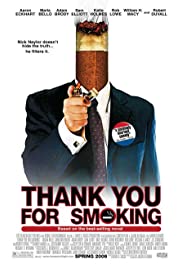
THANK YOU FOR SMOKING
US, 2005, 92 minutes, Colour.
Aaron Eckhart, Cameron Bright, Maria Bello, David Koechner, William H.Macy, Sam Elliott, Rob Lowe, Adam Brody, Robert Duvall, Kim Dickens, J.K.Simmons, Katie Holmes, Dennis Moore, Aaron Lustig.
Directed by Jason Reitman.
No, this is not a misprint. The tobacco industry does want to thank people for smoking and for keeping them in business. And, as filmgoers saw from The Insider some years ago, the industry has lobbyists sweet-talking politicians and the media to win legal battles. The Insider was a serious look at a whistleblower and the consequences concerning smoking and its harm to health.
This film is a comedy. It is a satire, based on a 1990s book by Christopher Buckley. It has been written and directed by Jason Reitman (son of director Ivan Reitman whose films include Ghostbusters, Twins and Kindergarten Cop).
The American sense of humour is not noted for its irony. Americans seem to be much more straightforward, less subtle, in their jokes. The British, on the other hand, and those whose humour derives more from Britain, enjoy irony and are skilled at political black humour. So, it is something of a surprise to find an American film that relishes its satire and ironies.
In trying to find some adjectives that would give an indication of how it worked, I came across the American Bishops Conference review which referred to it as ‘trenchant’ and to Sight and Sound which said ‘sprightly’. Those two words do it justice. Not that everyone will find it funny. Senses of humour are notoriously different. While it generally keeps a good balance, some will be put off by the language, especially of some of the off-putting executives.
The focus is on Aaron Eckhart, smoothly and genially efficient as a lobbyist for ‘the Academy of Tobacco’. His talent is for talk and for argument, massaging half-truths and untruths. He can charm a young cancer patient on a TV talk show by proving that the industry would not want the boy to die – they would like him to live and to keep smoking. All through the film, we are aghast at the politically incorrect utterances and laughing at how awful they sound. These statements niggle at what we truly think about smoking and its health hazards.
One of the other strengths of the film is the relationship between the lobbyist and his son – although that is treated in a tongue-in-cheek way because one can see how the son (Cameron Bright) is talented in debate, is in need of a father-figure and role model, and follows his father on his jobs. He could see through his father – or he could eventually become his father. This gives the film another moral edge.
The film is also populated by a large number of character actors who give witty star turns. Rob Lowe is outstanding as a Hollywood agent, full of ponderous cliches and mimicking the values-free stances on persuading Hollywood to include smoking more in the movies. Robert Duvall is the crusty old captain who made his money through tobacco. J.K.Simmons (the editor in the Spiderman films) is hilarious as the rough-mouthed boss, while William H. Macy is a harassed, but hardball Senator from Maine leading a campaign for cigarettes to be labelled as poison.
The film also takes shots at other lobbyists, especially with a group who meet each week to discuss their progress (and their death count). They call themselves MOD (Merchants of Death). Maria Bello represents alcohol and David Koechner the gun lobby. And they get a lot of the devastating lines.
In the last year, there have been a number of very hard-hitting documentaries surprisingly critical of American corporations and institutions, especially McDonalds?, Enron and Wal-Mart?. This film is in that tradition but opts for exaggeration through humour and satire.
1. The title, irony?
2. Audience stances on smoking, beliefs, pro-smoking, against?
3. The history of smoking, tobacco, legal issues, lobbyists, court cases?
4. The American tone of the film, the locations, Washington DC, Congress, California? The musical score?
5. The initial debate, the range of guests, the compere, the dying victim, the stances, moods, the audience? Nick and his taking control, the dying man and his supporting Nick? The repercussions, the company and the lobbying, his reputation?
6. Nick Molloy, Aaron Eckhart’s performance, his job, his voice-over, lobbyist, advocates, his relationship with his bosses, BR and his style, the visit to The Captain and his background, the meetings, endorsement of the campaigns?
7. Nick’s personal life, his relationship with his former wife, his relationship with Joey, pride in Joey? Joey, his age, loyal to his father, inheriting his father’s skills?
8. The trio, their meetings, the drinks, the discussions, their advocacy, alcohol, firearms, fast food? The characters, Bobby J Bliss, Polly Bailey? Their amoral stances? The campaigns, support of Nick? Their attitude towards his treatment of Joey? The reactions to Nick’s behaviour, sense of betrayal, but finally working with him?
9. The Senator from Vermont, his wanting tobacco and cigarettes to be labelled as poison, his campaign, the artwork, his assistant and his help, mistakes? Vermont and the promotion of cheese? The hearings? The television debate with Nick? Nick and the death threats? The final hearings – and it is comments on the dangers of cholesterol and cheese?
10. Nick kidnapped, the nicotine patches, the group taking him, his own health, not able to smoke? His return?
11. The placement idea, people smoking in the movies? BR and his hesitations? The other associates? The Captain and his approval? Nick going to California, the meetings with Jeff Megall, Rob Lowe and the parody of the Hollywood producer, the plans, the scenario, cigarettes and space…? The assistant? The atmosphere of Hollywood hucksterism?
12. Joey, his attitudes to the school, Nick wanting to take him to California, the pressure on his mother, her partner, his work at school? His skill in debates? The visits, his enjoying them? His supporting his father’s arguments?
13. Heather Holloway, in herself, reporter, the interviews with Nick, the sexual encounter, his confiding in her? The article, the information, the expose? Nick being fired?
14. The visit to Lorne Lutch, the Marlborough man, old and grizzled, dying of cancer, his antagonism towards Nick? Nick and his persuasion, the bag of money, the argument? Lutch taking the money?
15. Nick, sense of collapse, depression? Joey urging him on? Going again into action? Telling all, frankness, going to the hearings, his defence, human choice for adults - cigarettes or not, the jibe about cholesterol?
16. His freelancing, his own company, Heather, her comeuppance, television and the weather? Joey and his skills in debating? Nick a new career as a lobbyist – and the issue of cell phones?
17. The impact of the film and its time, well received, an interesting and entertaining way of looking at these moral issues?
Agatha Christie's Poirot Curtain
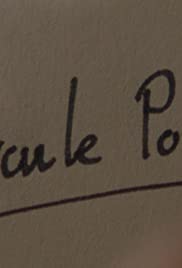
CURTAIN: POIROT’S LAST CASE
UK, 2013, 89 minutes, Colour.
David Suchet, Helen Baxendale, Hugh Fraser, Anne Reid, John Standing, Aidan Mc Ardle, Philip Glenister, Adam Englander, Alice Orr -Ewing, Shaun Dingwall, Matthew Mc Nulty, Anna Madeley, Claire Keelan, David Yelland.
Directed by Hettie Mc Donald.
Fans of Agatha Christie had high expectations for this final Poirot story. And it comes at the end of the television series of Agatha Christie mysteries with David Suchet bringing to an end 70 films as Poirot, beginning in 1989, ending in 2013. Suchet was 43 when he began the series and ended it at 67. Hugh Fraser, in fact, was a year older than David Suchet.
This is a rather dark film, even the photography is dark, especially the interiors of the mansion at Styles, the mansion where Poirot and Hastings began their investigations, the first of Agatha Christie’s novels. There is memory of the initial crime – and some more repercussions.
Poirot is old, sick, confined to a wheelchair, letting his servant, George, go and taking on a strong man who can lift him and carry him. And, this is one of the misleading aspects of the screenplay. The first two thirds of the film, while Poirot is present, he is somewhat in the background. Then he dies. But, with the device of leaving a manuscript for Hastings to read to get the solution of the crime, the final third has a very strong portrayal, giving David Suchet the opportunity to bring his expert performance as Poirot to a climax. And, climax it is, with some readers and audiences shocked that Poirot could execute the villain – with discussions about justice and also with Poirot’s Catholicism and talk of God’s forgiveness.
There is the usual gathering of characters, tensions between them, including Hasting’s daughter Julia whom Hastings has come to visit after the death of his wife. One of the interesting aspects is that Hastings, disliking the man that his daughter seems to be infatuated with, begins a plan to kill him. He repents and regrets.
Aidan Mc Ardle is very good as the seemingly meek and mild visitor, a mother’s boy, observing, stammering, but insinuating himself into the lives of all the guests. He is particularly effective in the final confrontation with Poirot, smug and arrogant, shocked that Poirot is to execute him.
While some were disappointed with this conclusion to Poirot’s career, Agatha Christie has once again been ingenious in dramatising his final case and his death.
1. The popularity of the television series of Agatha Christie mysteries, with David Suchet as Poirot? 70 films, this film the culmination? The series beginning in 1989, David Suchet 43 at the time? This last film, 2013, David Suchet at 67?
2. Agatha Christie’s first novel, The Mysterious Affair at Styles? Poirot’s first case? This finale and a return to Styles, further enlightenment on the initial mystery, the daughter of the murdered man? The involvement of other characters in that mystery?
3. Poirot, old age, infirm, his appearance, health, in the wheelchair? His being cared for? The daughter and her care? The couple and the administration of the house? The ironies of the later development of the plot, Poirot dismissing George, his faithful servant, because he would recognise that Poirot was not infirm as he claimed? Taking on of the strong assistant who could carry Poirot? Then the revelations that Poirot could walk, and the significance of this for the plot developments? David Suchet’s performance, exhibiting Poirot’s illness and weakness, yet his strength and determination?
4. Poirot dying two thirds of the way through the film? A seeming lesser performance? The last third of the film, the flashbacks, and the final strength of David Suchet’s performance?
5. Readers’ response to this last Poirot story? Grim? And Poirot and the execution of Norton? Readers and audiences Approving or not? Justice issues, the law and administering justice? The religious dimension? Poirot and the background of his Catholicism? His comments about God and forgiveness? Praying the rosary?
6. Hastings, the long friendship, involvement with the cases, his frequent non-comprehending? The death of his wife, the presence of his daughter, the reunion with Poirot? His concern about Poirot’s health? His daughter and her forthrightness about the value of life? His reaction to seeing her with Allerton? The temptation to kill Allerton? Poirot drugging him, setting up the situation? His change of heart and regrets? Poirot and his warning about a murder to be committed? Hastings and his apprehension? Poirot reprimanding him? Telling him about the clues, the box? And Hastings reading the manuscript?
7. Those present at the mansion? The Luttrells, buying the building, its need for repair? The original owners, the background of the murder at Styles? Elizabeth and her presence, the memories, melancholic, playing the piano, observing? Allerton, his reputation, his charm? Nurse Craven and her care for Mrs Franklin? Mrs Franklin,
hypochondriac, moody? Ambitions? Her flirting with Carrington? Dr Franklin, his research, relationship with his wife?
8. The presence of Norton? The story about his living with his mother? His stammer, seeming friendship? The discussions at table, the value of life? His binoculars, coy about what he saw?
9. Julia, misunderstood by her father, her relationship with Dr Franklin, his assistant? Mrs Franklin’s death? Julia to marry Dr Franklin?
10. Mrs Franklin, her death?
11. The drink, the drug, Poirot moving the cups?
12. The buildup to Poirot and his death? The pathos?
13. Four months later? Hastings reading Poirot’s document? The strong portrait of Poirot in the flashbacks? His knowledge of the situation, reading of characters? The revelation about Norton? Norton’s background, rejection by his mother, his malice, in the first affair at Styles, insinuating, understanding people psychology, using it? Misleading about Julia and Allerton? Misleading Hastings? Insinuations about Dr Franklin? The confrontations with Poirot? Poirot and the invitation to his room, the confrontation and explanation? Norton’s superiority, Poirot saying he would execute him? Norton’s arrogance? Poirot, the dressing gown, misleading Hastings, going to the room, the duplicate key, the gun, shooting Norton?
14. The aftermath, Poirot and his issues of justice, religious issues, God and forgiveness? And dramatic ending to Poirot’s life and career?
Hot Rod
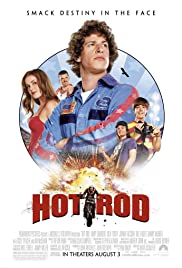
HOT ROD
US, 2007, 88 minutes, Colour.
Andy Samberg, Jorma Taccone,, Bill Hader, Danny Mc Bride, Isla Fisher, Sissy Spacek, Ian Mc Shane, Will Arnett, Chris Parnell.
Directed by Akiva Schaffer.
This is one of those very broad American comedies, love it or loathe it, clever or stupid.
The main actors and the director were for years involved in writing and acting for Saturday Night Live. And it is produced by Lorne Michaels, the producer of Saturday Night Live.
It might be said that this story is in the Dumb and dumber vein, (dumber or dumberer). Some of the cast specialise in creating dumb comic characters on screen, Andy Samberg, Bill Hader, Danny McBride?, Will Arnett. The performances here will depend on audience liking for the actors, enjoying their comedy – or not.
In terms of cast, it is something of a surprise to see Sissy Spacek and Ian Mc Shane in the cast. Isla Fisher has been in a number of comedies (and is married to Sacha Baron Cohen).
Andy Samberg clowns and mugs as Rod Kimble, devoted to his mother, Sissy Spacek, antagonistic to his stepfather, Ian Mc Shane, who continually baits him and mocks him out would seem in physical fights. But, his stepfather needs a transplant. Rod then narrates the memory of his father who was a stuntman, photographed with Evel Knievel. Rod wants to be in that tradition, tries all kinds of stunts – absolute failure. But it is supported by his loyal but dumb friends. Isla Fisher portrays his past girlfriend but is now taken up with the superior-smug Will Arnett.
The plan is for Rod to raise the money for the transplant and to do a daring stunt, riding his bike over 15 buses side-by-side. One moment we think you might succeed but, of course, he makes a mess of it but gets up to the acclaim of the onlookers and the local media who applaud him and raise the required money.
All ends well – with Rod and his stepfather still battling it out.
Something of an acquired taste – which many will not want to acquire.
Agatha Christie's Poirot Four and Twenty Blackbirds
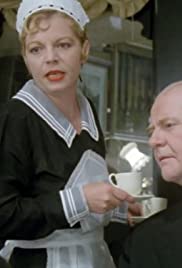
FOUR AND TWENTY BLACKBIRDS
1989, 50 minutes, Colour.
David Suchet, Hugh Fraser, Philip Jackson, Pauline Moran, Richard Howard, Tony Aitken, Charles Pemberton, Holly De Jong, Clifford Rose, Hilary Mason.
Directed by Renny Rye.
This is one of the earliest short stories in the television series of Agatha Christie murder mysteries featuring David Suchet as Poirot.
There are settings in London as well is in Brighton. There is a visit to an art class, an exhibition of paintings, to a Music Hall with Hastings enjoying the comedy.
There is an initial natural death followed by a murder. The two deaths involve twins who have not spoken to each other for decades. There are only other relative is nephew who is a manager of the Music Hall.
Poirot becomes involved out of curiosity, seeing the brother who is the artist, a scruffy old man, who dines regularly at a restaurant which Poirot is visiting with his dentist. He begins the investigation, questioning the neighbours, the doctors, visiting Scotland Yard and finding Chief Inspector Japp and the forensic developments.
The audience may well realise what has happened in terms of the old man, disguise, performance.
1. The rhyme? Poirot remembering it? Henry Gascoigne and the final meal? The desert? No stain on the teeth of the corpse? The key to the solution?
2. Scenes in London, Poirot’s apartment block, his office? The dentist? The restaurant? Henry Gascoigne scruffy, regular visits? The arts class? The painting exhibition? The music hall, the performance, backstage? The funeral, the home in Brighton? The musical score?
3. Anthony Gascoigne, Mrs Hill looking after him, his death? Her phone call to George Lorimer, his not coming? Finally arriving, making the funeral arrangements? Mrs Hill and her upset?
4. Poirot, the friendship with Hastings, the work of Miss Lemon? The connection with Chief Inspector Japp? Modern forensic developments at Scotland Yard?
5. The interrogation of the neighbours, the woman disliking foreigners, the visit to the doctors and their opinions?
6. Henry Gascoigne, at the restaurant, his regularity, his meal, the changing menu? The neighbours finding him dead? The fall and his injuries? His background as an artist? The interview with Dulcie, her attitude, posing at the art class? Her paintings? The manager, meeting at the gallery, the discussions about the financial situation?
7. The visit to the theatre, Hastings enjoying the comedy? The actor and his disguise? The discussions with George Lorimer, with his assistant?
8. The visit to Brighton, the funeral, the discussions with George Lorimer, Mrs Hill and her reaction?
9. The audience suspecting the disguise? The murderer?
10. Poirot, the explanation, the clash between the two brothers, Anthony’s wife in the painting, they’re not speaking, issues of wills? Anthony dying, Henry inheriting, Henry dying and George in control?
Dangerous Lies
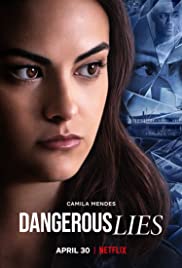
DANGEROUS LIES
US, 2020, 96 minutes, Colour.
Camilla Mendes, Jessie T.Usher, Elliot Gould, Cam Gigandet, Jamie Chung, Sasha Alexander, Michael P. Northey.
Directed by Michael Scott.
In comparison with many other thrillers, this one, despite its title, is rather mild. Which means that the average audience might be able to sit through it comfortably and enjoy it. On the other hand, there is a lot of commentary about its being too mild.
Camilla Mendes and Jessie T Usher play married couple, Katie and Adam, she working in a diner, he studying, but falling on difficult financial times even after he does some heroics in stopping a robbery in the diner. By this time, she is a carer for an elderly gentleman, Leonard, who lives alone in a mansion. He is played by Elliot Gould (the character being 88 but Gould being 80 the time of filming). He dies and there are all kinds of complications, money stored in a chest in the Attic, an estate agent visiting and pressing Katie for a sale. An unexpected lawyer (Jamie Chung) who announces that Leonard has left everything to Katie. Then the police investigate the death, are suspicious of the couple. Adam begins to enjoy the inheritance that Leonard has left them, becoming extravagant.
Ultimately, there is a background story of a diamond robbery, a murder, violent threats to the couple and a mixture of happy and unhappy ending.
1. The title? The characters and their lies? The consequences of lies?
2. The setting, the city, diners, mansions, police precincts? Musical score?
3. Introducing Katie, at working the diner, flirting with Adam, married? The episode in the diner, Adam intervening, the death? The police, acclaim as a hero?
4. Four months later, Adam giving up his studies, the financial difficulties, the tensions? Katie and her working for Leonard, friendship, care, discussing her money situation, his giving her the cheque? The issue of banking it or not? The later repercussions, banking it the day before Leonard died?
5. Leonard, Elliot Gould, genial old man, his mansion, the family traditions? Enjoying Katie's company? Care? The money? The discussions with Adam, hiring him to work in the garden?
6. The suddenness of Leonard's death? The police intervention and enquiry? The revelation that he had been killed, Hayden's presence in the house? Hayden's visit, real estate, the pressure on Katie? His return? Threats?
7. Adam finding the chest of money, decisions, taking it? Adam later hiding it? Katie's conscience?
8. Julia's arrival, the will, leaving everything to Katie? Including the house? The detective and her suspicions? Interrogations?
9. The discovery of the dead body, the diamonds? The speculation about the situation, Hayden and his connection, the murder?
10. Suspicions about Adam's alleged complicity in the crime at the diner? Later being exonerated?
11. The cremation, the sadness? Further suspicions about Leonard's death?
12. Hayden in the house, Julia arriving, the confrontation with the guns, Adam being shot, his shooting Hayden? Julia and her threats? The detective arriving, shooting Julia? Adam's death?
13. Four months later, Katie working in the garden, case closed? And the glimmer of the diamonds in the compost around the tree?
14. The plot and treatment? Complications? Red herrings?
Agatha Christie's Poirot Third Floor Flat
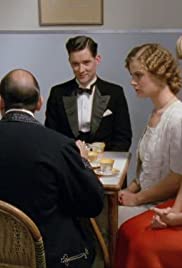
THE THIRD FLOOR FLAT
UK, 1989, 50 minutes, Colour.
David Suchet, Hugh Fraser, Philip Jackson, Pauline Moran, Suzanne Burden, Nicholas Pritchard, Robert Hines.
Directed by Edward Bennett.
This is one of the earliest of the short films based on Agatha Christie stories, part of the television series with David Sichet as Poirot.
This quite a domestic story, the focus on the apartment block where Poirot lives, the flats below him. There is some comedy with Poirot reacting against the treatment for his cold, insisted on by Miss Lemon. Hastings is preoccupied with his new car. However, they go to the theatre and Hastings makes a bet with Poirot about the solution to the murder on stage – with Poirot entirely wrong and making excuses for his solution.
The audience sees a new tenant and her agitation. When the young group returns from the theatre and cannot get into their flat, the two young men go down to the basement and come up in the lift, entering the wrong flat and discovering the body. Chief Inspector Japp does arrive and makes a contribution but Poirot solves the case fairly quickly – one of the escorts, the dead woman being his wife and his wanting a divorce, his shooting her.
And there is some action drama in the finale as he tries to make his escape through the lift shaft and into Hastings car – and crashing it!
1. The popularity of the television series of Agatha Christie mysteries with David Suchet as Poirot? This as one of the earliest films?
2. The London settings, Poirot’s office, the flats in his building, the visit to the theatre? The interiors of the flats? The musical score?
3. The introduction to Mrs Grant, the desk moving in, the music and noise from above, her impatience, the letter under the door? Her visitor? Her being found dead, moved? The maid not noticing anything? The issue of mail delivery?
4. Poirot and Hastings, Poirot and his cold and the treatment? The bet with Hastings about the play and whodunnit? Attending the play, seeing the group at interval? Poirot’s solution, his excuses, entirely wrong, and his paying his debt?
5. Patricia and the group, the background, dancing upstairs, theatre? Singing on the steps? The missing key? The two men, escorting the women, going to the basement, coming up in the lift, Poirot and Hastings watching? Getting into the flat, the wrong flat, the discovery of the body?
6. Poirot and Hastings coming down, discussions with the girls, the body, the letters, investigation and questions? Chief Inspector Japp and his arrival, contribution?
7. Poirot and the ether, Donovan’s collapse, recovery? Jimmy and his questions? Donovan going upstairs to rest?
8. Poirot and his solution, the flashbacks revealing Donovan and his being the husband, wanting the divorce, infatuation with Patricia, coming for the letter about the divorce and marriage, shooting Mrs Grant? Poirot getting the key from his pocket, the letter?
9. Donovan escaping, hiding in the lift, Hastings searching the street, Donovan getting into Hastings’ prized car, the crash?
10. Explanations and happy ending?
Happy Facce Killer
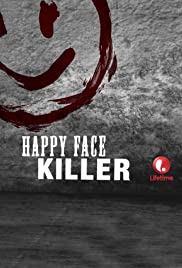
HAPPY FACE KILLER
US, 2014, 83 minutes, Colour.
David Arquette, Gloria Reuben, Darrell Shuttleworth.
Directed by Rick Bota.
American udiences seem to have a steady appetite for feature films exploring the psyche of serial killers while showing them in action, their external manner, their interior psychological struggles.
This is a brief film, based on fact, showing some of the serial killings of Keith Jespersen and trying to give some dramatic interpretation of his psyche, the difficulties of his upbringing, his moods and angers, sexual behaviour, his defiance of the authorities, his signature happy face drawn on the victims.
David Arquette is a smiling villain, initially charming, even seductive, but becoming angry with his wife leaving him and taking the children, his spending a lot of time on the road as a truck driver, taking on extra work, picking up women at diners – and the dramatising of several of his murders and disposing of the bodies in ditches in the countryside.
Commentators note that the FBI was not initially called in and a lot of the investigations were done locally. However, Gloria Reuben portrays a seasoned FBI agent who tracks the killer and eventually confront fronts him.
The screenplay was written by Richard Christian Matheson, a seasoned author of fantasy and horror stories, the son of the celebrated novelist and screenwriter, Richard Matheson.
Clearly, not a profound psychological exploration of the mind of the killer but a dramatisation of who he was, how he operated, and suggestions to understand his character and state of mind.
1. A drama based on facts, an actual killer, serial killer? The dramatising for a brief feature film?
2. The North Western states, homes, diners, the roads, the open countryside? The musical score?
3. The portrait of Keith Jespersen, as played by David Arquette, the happy face? The introduction, cheerful, driving, his boss, always on the road, the note from his wife, separation, taking the children? The effect on him?
4. The interviews with his brother, the background of their childhood, the discipline of their father, Keith and his tormenting the animals? His moods?
5. The marriage, Keith’s wife, his visits, wanting to see the children, bringing presents? Her being unwilling to return?
6. The gradual revelation of his moods, tantrums? Yet keeping the happy face? The driving? The visits to the diners? Friendly?
7. The dramatisation of picking up the girl, her being very forward, taunting him, his killing her? Taking the body, the burial? The discovery of the body? The further encounters with the women, picking them up, sexual activity, the murders, disposing of the bodies? The difference with the woman with her baby, his letting her go? Her giving information about him?
8. Local investigations, the calling in of the FBI, authority and jurisdictions? The reaction of Sheriff Cotton and his staff? Melinda Gand and her reputation, her taking charge? The eventual collaboration between the FBI and local jurisdictions?
9. The case of the woman claiming that her boyfriend was the murderer and that she assisted? Her scenario, the investigations? Confessions? The role of the district attorney, Melinda gained and her representations? Her continuing to investigate?
10. The media, the reports of the confession? Keith and his reaction, his angers? His sending letters? His being ignored? Melinda Gand and her suspicions, interviewing him, his smiling denials?
11. The signature of the happy face, drawing it on the bodies, the distance face with a stone surrounding the body, his letters? His knowledge of details?
12. His brother’s observations? Other witnesses? The background of the murdered women? His overstepping his mark, caught, the collaboration of the boss of the trucking company, Melinda Gand and her confrontation?
13. A brief film, the possibilities for exploring the psyche of the serial killer, some simplifications for the drama?
Uncorked
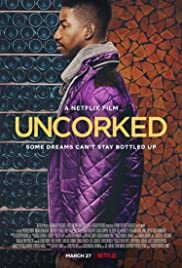
UNCORKED
US, 2020, 104 minutes, Colour.
Mamadou Athie, Courtney B.Vance, Sashun Compere, Lathun Pollard.
Directed by Prentice Penny.
While this family drama is set in the African- American community in Memphis, Tennessee, the basic plot is applicable to many families in many cultures.
The focus is on a young man, Elijah (Mamadou Athie), in his 20s, destined to work in his father’s restaurant, his father having inherited the business from his father. It is the family business.
However, Elijah’s vision goes beyond working in the family business, he has a special skill with wines, expertise in tasting, identifying… He takes the opportunity to develop his skills, attend courses, and a new world opening up for him. And, as we might expect, his stern father (Courtney B.Vance) is not in favour. Deep down, he does understand, but in practice he does not. On the other hand, he is supported by his loving mother (who has problems of her own, diagnosed with terminal cancer).
Elijah tries to combine living in both worlds. He works hard in the restaurants. This is made all the harder by the stern attitude of his father. He enrols in studies, makes a number of friends, wants to qualify as a professional. In fact, this includes the student group going to Paris for further education, the family chipping in for money to pay his fare.
But, fate and fatality intervene, especially with the illness of his mother. Elijah experiences some depression, the feeling that he is not destined to fulfil his ambitions, resigned to working for his father.
There is a happy ending but not in the way that we might have been expecting or hoped for. Elijah does have some communication with his father, even gaining some support. But, as the film ends, he has not reached his goal – but, he hopes, and we hope, that he is well on the way.
1. The title? The focus on the bottles, wine?
2. Memphis, the African- American community, the restaurants, homes, business connections? The wine bar? The Institute for Sommeliers, study and lectures? The trip to Paris, the atmosphere of Paris, the French countryside, the Institute and learning? Musical score?
3. Elijah’s story? Age, upbringing, working in the restaurant, beside his father, love for his mother? In the bottle shop? The encounter with Tanya? Meeting again, dates, the sexual relationship? His relationship with his father, not wanting to work in the restaurant, his knowledge of wines, his skill? His wanting to study?
4. The father, his background, not going to college, wanting to teach, working with his father, admiration for his father and his setting up the restaurant? Successful for many years? The practical running of the restaurant, the kitchen, going to abattoirs, the prospect of a further restaurant with bar? His devotion to the memory of his father? Expectations of Elijah?
5. The mother, genial, the cancer, out with her husband dancing, the cancer returning, hospital? Her concern for her son, raising the money for him to go to Paris? Her joy at the photos, the phone calls, a decline, her death? The funeral and its atmosphere?
6. Elijah, his working with his father, his kitchen skills, limitations? His going to study? Preparation for the exam? Going to the Institute, the fellow students, one bespectacled and awkward, the other from the wealthy background, the young woman? Their working together? The team? The decision to go to Paris? Working together, the classes, the role plays? The wealthy son having to return home?
7. The details of the study to become a Sommelier? Wine tasting? Discernment of flavours, on grapes, locations, age…? The role play and Elijah making mistakes with the customers?
8. The effect of his mother’s death? The up-and-down relationship with Tanya? Yet the support of the family, the extended family, the cousin with his music, his sister and her girlfriends?
9. The impact of his mother’s death? The return from France? Working in the restaurant, great attention to detail? His future?
10. The discussions with his father? His father accepting that wine was his son’s great interest? His beginning to help, the post-its around the restaurant, his father helping him to learn and to revise? The buildup to the exam? His father giving him his grandfather’s suit? Accompanying him to the exam?
11. Elijah and the discussion, his qualities, where he missed out? Accepting his failing? The urgings of his girlfriend? The prospect of studying for another year? Going to the restaurant, his bespectacled friend having his Masters?
12. Not a neat and happy ending – but hopeful prospects for Elijah, further studies, achieving his goal?
Thicker than Water
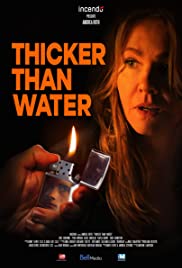
THICKER THAN WATER
Canada, 2019, 90 minutes, Colour.
Andrea Roth, Katie Douglas, Eric Osborne, Tygh Runyon, Jason Smiley.
Directed by Caroline Labreche.
This is a thriller of menace.
Parents are grieving the death of their son, a college student. The mother is particularly upset and cannot go back to her ordinary life, back to work. Her husband and daughter try their best to help her. There is a suggestion that they should take in a paying boarder. A good idea in theory but, for this drama, their choice is deadly. They accept a charming psychopath who infiltrates the family, especially in his effect on the mother. Ultimately, of course, some menace, some violence
1. Thicker than blood? Relationships? Alternate title of “The Twisted�?
2. The familiar setting, the city, the house, the campus, workplaces, the countryside? Musical score?
3. The family situation, the drug death of the son, the mother’s grief, the father and his having to cope, the daughter and her memories? The situation at home, the mother not wanting to do anything, not going back to work, the father and his trying to do the best, the daughter and her studies?
4. The financial situation, having to take in border, renting the room?
5. The introduction to Brandon, the details of his story and background, coming to study, the encounter with fellow students? The notice about renting the room? His presenting himself well? Paige and her changing her mind, welcoming him? His saying all the right things? His room, the memories of the dead son? His ingratiating himself, courtesy, helping, meals…?
6. The change in Paige, coming to life, her previous refusal to go out, her daughter’s games, clashes with people at work? Her focus on Brandon? Their time together?
7. The daughter, suspicions, investigating, building up to confrontation? The father and his dealing with the situation?
8. The transition to violence, threats, danger to page? The buildup to the final confrontations and rescue?
9. The portrait of a sociopath?
Agatha Christie's Adventure of Johnnie Waverley
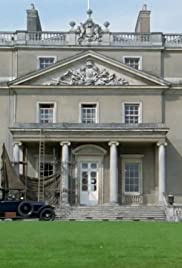
THE ADVENTURE OF JOHNNIE WAVERLEY
UK, 1989, 50 minutes, Colour.
David Suchet, Hugh Fraser, Philip Jackson, Pauline Moran, Geoffrey Bateman, Julia Chambers, Dominic Rougier, Patrick Jordan.
Directed by Renny Rye.
This is an early contribution to the 70 television films of Agatha Christie mysteries with David Suchet as Poirot. In fact, it is the third film. (In the early films, Poirot is somewhat sharp with people, in this film with Hastings after a car breaks down. He mellowed much more in the following films.)
As soon as the father and mother of the boy who is abducted appear, it seems pretty evident that the father will be the villain, a very unpleasant husband towards his wife, arrogant with Poirot, insultingly aggressive to Chief Inspector Japp. He wants Poirot’s help because he has a message that his son will be abducted at midday the next day. He complains that the police have done nothing – although Inspector Japp comes down with a squad of police to prevent the abduction.
Mr Waverley describes himself as a squire of the land, with an ancestral home which is being renovated, but he has run out of money. He dismisses most of his staff, suspicious of them. His wife becomes ill the night before the kidnapping.
We suspect that Mr Waverley is responsible for the abduction, has concocted the whole event along with his long-time butler and the butler’s niece.
No murders, not as much excitement as in other episodes, but Poirot realising what has happened.
1. The popularity of the television series of Agatha Christie mysteries with Poirot played by David Suchet?
2. Poirot and the block of flats, his office, Miss Lemmon and her filing system, Hastings and his interest in cars, the visit of Mr Waverley, while responding, visiting Chief Inspector Japp, Waverley insulting him because of the lack of police response to the messages?
3. Hastings driving to the home, Poirot on the train, the conversations with Mr Waverley, Mrs Waverley, the boy playing with his nurse?
4. The formality of the dinner, the mother upset, the boy going to bed? Poirot awakening in the night, Mrs Waverley and her illness? Her being confined to bed the next
day?
5. Some humour about English breakfast, the fish and rice, going to the cafe for the proper breakfast? Hastings driving, the two singing, the car breaking down, Poirot walking through the fields?
6. Japp and the police, guarding the house, the clock put forward, the intrusion of the tramp, the message? The boy disappearing during the upset?
7. Poirot, the puzzle, the interview with the butler, the issue of the priest’s hole? Poirot, Hastings, the tunnel, Poirot working out what happened, demanding that Waverley take them to the boy, the role of the butler, his niece minding the boy? Waverley wanting money for the renovations and his status from his wealthy wife?
8. Poirot, solving mysteries? Hastings accompanying him? On the verge of more telling and mysterious stories?